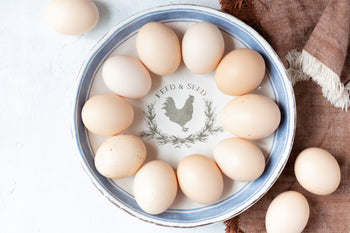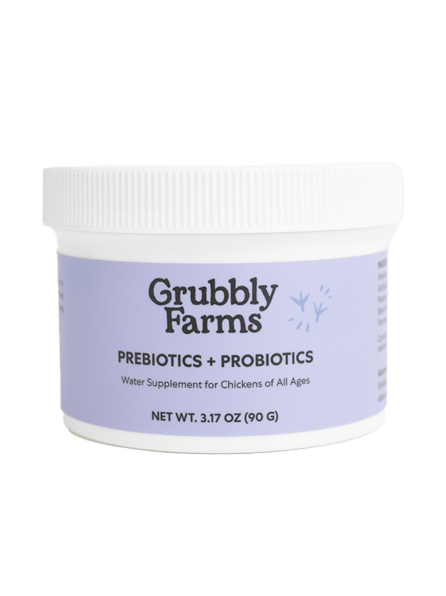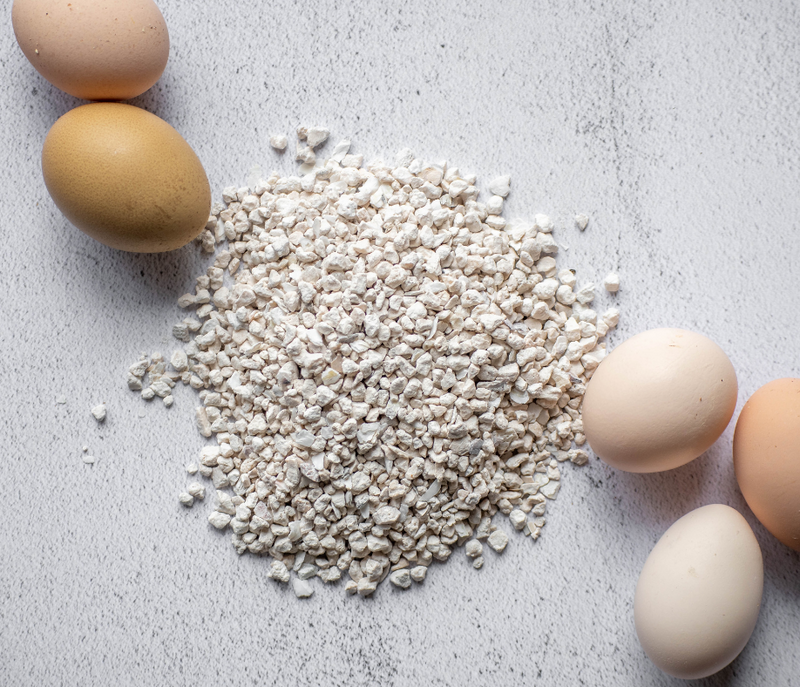Everything you ever wanted to know about storing and preserving chicken eggs.
Learning how to store and preserve chicken eggs is a great way to use up fresh eggs during times of bounty and put away eggs for when your flock has a lull in laying. Whether you’ve got dozens in your fridge, or you just don’t know how to store the fresh eggs your flock lays, there are numerous ways to store or preserve fresh eggs. Even if you don’t need to preserve fresh eggs, knowing how to store them properly is still important. Keep in mind that fresh eggs from your backyard flock are best stored unwashed and pointy end down. Unless an egg is dirty or stained, you are better off not washing fresh eggs. When preserving eggs, only choose the freshest eggs that are clean and unwashed.
How to Store Fresh Chicken Eggs
Fresh eggs are one of the greatest gifts chickens give us! Know how to store them properly truly makes the most of the bounty from your flock.
Storing Eggs without Refrigeration: Room Temperature Egg Storage Guidelines
Fresh eggs that have not been washed naturally have a long shelf-life thanks to the protective bloom that covers the egg. The bloom is a protective film that is applied to the entire eggshell right before the egg is laid. The bloom is what makes a freshly laid egg look shiny and feel wet. Once the bloom dries, which is usually within a few seconds after the egg is laid, it provides a protective barrier over the porous eggshell to keep harmful bacteria out of the egg.
Fresh Eggs' Shelf Life
An egg that has not been washed will have a counter shelf-life of about 1 week. While the eggs may not go bad if stored at room temperature for over a week, their quality will start to deteriorate, and you risk the chance of spoilage. How long a fresh egg will last at room temperature does depend on environmental conditions such as temperature and humidity.
In the fridge, an unwashed egg will last even longer, even up to several months! When an egg is washed, the protective bloom is washed away. A washed egg will not last as long in the fridge and should not be kept at room temperature. To clarify, when we refer to fresh eggs we are talking about fresh, unwashed eggs.
Humidity is a key factor in storing fresh eggs at room temperature or in the fridge. When fresh eggs are stored at the proper humidity and temperature their shelf-life is extended. High humidity can cause mold growth while low humidity will cause the egg to dry out due to evaporation. High temperatures encourage spoilage faster while temperatures that are too low will make the egg freeze. Fresh eggs that are stored at about 55°F with 75% humidity will last for about 2-3 months. Fresh eggs that are stored at 30°F with 85% humidity will last for up to 9 months. It is important to note that the freezing point for eggs is 28°F.
Tips for Refrigerating Fresh Eggs 
Refrigerating eggs, or storing them in a cool location is one of the most common ways to extend the shelf-life of fresh eggs. Fresh eggs that are stored in a carton and kept on the coolest shelf in the fridge will last up to 5 weeks. They can last longer if the humidity is high to prevent too much evaporation.
One way to make refrigerated eggs last even longer is to wrap each egg in plastic wrap. This adds another protective layer against the eggshell to prevent moisture from evaporating. Plastic wrapped eggs stored in the fridge will last for up to 2 months.
While fresh, whole eggs have quite a shelf life when stored in the fridge, once the egg’s contents are out of the shell their shelf-life rapidly declines. Leftover egg whites can be stored in an airtight container for up to 4 days while leftover eggs yolks can be stored in cold water in an airtight container for up to 2 days.
Methods of Preserving Chicken Eggs
When it comes to keeping your eggs longer, these methods will come in handy. Try one or several that will work for you!
How to Freeze Chicken Eggs
You don’t want whole, fresh eggs to freeze. When an egg freezes, the contents expand which then causes the eggshell to break. A break in the eggshell of a frozen eggs can allow bacteria to enter the egg. However, you can freeze fresh eggs out of the shell! There are several methods for freezing eggs, one of the easiest ways is to use a silicon ice cube tray.
-
- Crack a single egg in a small bowl and scramble the contents.
- Pour the scrambled egg into one of the slots in the ice cube tray.
- Repeat with as many eggs as you want to freeze.
- Cover the ice cube tray with a lid or plastic wrap and place the ice cube tray in the freezer. Wait for the eggs to freeze, it is a good idea to wait at least 24 hours.
- Once the eggs are frozen, pop them out of the ice cube tray and place the egg cubes in a plastic freezer bag for long term freezer storage.
You can scramble multiple eggs together if you plan on using multiple frozen eggs. Frozen eggs can be used in baking or they can even be made into scrambled eggs. When you want to use a frozen egg, allow the frozen egg cube to thaw in an airtight container in the fridge.
You can also freeze partially cooked scrambled eggs. You will want to slightly undercook the scrambled eggs, place them in a covered container to cool in the fridge, then transfer them to an airtight container to freeze them. When you want to enjoy the scrambled eggs, let them thaw in the fridge and then re-heat them! Sightly undercooking the eggs before freezing them gives you some leeway for cooking the eggs after you thaw them.
How to Pickle Eggs
Pickling is an age-old method of preserving fresh eggs. To pickle eggs, you will first have to hard-boil the eggs and peel off the shell. You then pack the warm boiled eggs into clean pint canning jars and cover them with a warm spiced vinegar solution.
Small eggs are best used for pickling. Their small size allows the pickling solution to penetrate the eggs thoroughly which ensures better preservation. Small eggs will also pack into jars easier, and you want to minimize the amount of empty space within each jar of pickled eggs. After the jars have been packed with the eggs and warm spiced vinegar, you will want to let them cool. Once cool, the pickled eggs can be stored in the refrigerator for several months. It is a good idea to let the eggs ‘season’ for 2-4 weeks before enjoying your pickled eggs. Refrigerated pickled eggs will last up to 6 months.
How to Preserve Eggs in Mineral Oil
Oiling fresh eggs may sound strange, but it is a great way to add an additional protective layer around the egg to extend its shelf-life. Fresh eggs should be allowed to rest for at least 24 hours before they are oiled. The resting period allows for the natural escape of carbon dioxide from within the egg. The eggs should be allowed to rest at room temperature, and they should be completely dry (no condensation) before oiling. To oil the fresh eggs, follow these steps:
-
- Warm food-grade mineral oil over low heat to kill any bacteria. Allow the oil to cool slightly so that it is warm to the touch but not hot. You don’t want to cook the egg when you dip it in the oil.
- Dip each egg in the oil and place the dipped eggs on a wire rack with a tray beneath the rack to catch any oil that drips off.
- Allow the eggs to rest on the rack for at least 30 minutes to allow extra oil to drain off.
- Place the oil coated eggs, pointy end down, in clean egg cartons.
- You will want to slightly raise one end of the carton for long term storage. On a monthly basis, switch which end of the carton is raised. This gently turns the eggs and keeps their contents intact.
Oil covered eggs stored at 50°F will last for up to 8 weeks (about 2 months). However, tests have been done with storing oiled eggs at warmer temperatures and have shown that oiled eggs can be stored at 70°F for up to 5 weeks. In the fridge, oiled eggs can last for up to 9 months, although some off flavoring may occur if the oil starts to go rancid or as the oil permeates into the egg. It is important to note that oiled eggs should not be relied upon as a leavening agent in baked goods and the egg whites from oiled eggs cannot be beaten into meringues.
How to Thermostabilize Eggs
Thermostabilizing is a lesser-known way of preserving eggs. It involves heating the egg up just enough to kill any bacteria on the shell and to slightly cook or coagulate a layer of eggs whites just beneath the shell. Eggs should be thermostabilized within 24 hours after being laid and they should be room temperature. The basic method for thermostabilization of fresh eggs is as follows:
-
- Heat water in a deep pot until it is exactly 130°F. Make sure you are using an accurate thermometer to measure the temperature of the water. You don’t want to overcook or undercook the egg when thermostabilizing it.
- Submerge each egg in the water for 15 minutes. A deep slotted spoon or strainer is helpful for easily submerging and removing eggs from the water.
- After 15 minutes, remove the egg and place it on a rack to dry.
- Once dry, the eggs can be stored pointy end down in a clean egg carton.
Thermostabilized eggs stored around 65°F will last for about 2 weeks and stored at 34°F they will last for up to 8 months. Thermostabilizing and oiling fresh eggs are often combined to make their storage life even longer. The two processes can be combined by heating up oil instead of water to dip the eggs into.
Water Glassing Fresh Eggs
Water glass is another lesser-known method of preserving fresh eggs. Water glassing eggs involves storing eggs in a syrupy concentrate of sodium silicate, which is called water glass (food grade sodium silicate can be purchased online). Water glassing minimizes evaporation of the egg’s contents and prevents bacteria growth which can cause an egg to spoil. Again, fresh eggs should be water glassed within 24 hours of being laid. It is very important that the eggs used for water glassing be naturally clean and free of blemishes like a weak shell, hairline cracks, or other abnormalities. The basic water glassing method goes as follows:
-
- Combine 1 part water glass solution to 10 parts boiling water. Mix the solution thoroughly and allow it to cool.
- Place clean eggs in a clean jar and pour the cooled solution over the eggs until it covers them by 2 inches.
- Screw a lid onto the jar and store the jar in a cool, dark location.
- Don’t save any leftover water glass solution to use later.
Stored at 36°F, water glassed eggs will last for up to 6 months. Eggs can be added or removed from the jar as needed as long as the solution stays at least 2 inches above the eggs. The eggs should also be used on a first-in, first-out basis to ensure the oldest eggs don’t get left in the solution too long.
How to Dehydrate Eggs
Dehydrating fresh eggs can be done by either keeping the eggs raw or by cooking them. However, as a safety precaution it is better to dehydrate cooked eggs rather than raw eggs. If you do want to try dehydrating raw eggs, you should either scramble the yolks and whites together or separate the two and dehydrate them individually. For dehydrating cooked eggs, you can make scrambled eggs and then dehydrate them. Dehydrating cooked scrambled eggs is faster than dehydrating raw eggs and there is less of a chance for bacteria to cause issues.
Eggs should be dehydrated at 135°F for 4-6 hours. Raw eggs will take longer, up to 8-10 hours. To make dehydrating raw eggs safer, it is better to dehydrate them at 160-165°F. When dehydrating raw eggs, you will want to stir them halfway through the dehydration time to break up a thin ‘skin’ that forms over the raw eggs as they dehydrate. After the eggs are dehydrated you can pulse them in a food processor to make egg powder or leave them as they are.
How to Re-Hydrate Eggs
When rehydrating dehydrated raw eggs, you should use a 2:1 ratio of egg powder and water. To equal one egg, combine 1 tablespoon of egg powder with 2 tablespoons of water and let it set for a few minutes. The resulting rehydrated egg will appear grainy but will behave the same way as a normal egg in baked goods.
How to Freeze Dry Eggs
Freeze drying eggs is like dehydrating eggs except you need to use a freeze-drying machine. You can freeze dry eggs that have been scrambled and cooked or you can freeze dry raw scrambled eggs. The resulting egg powder is usually finer than dehydrated egg powder. For freeze-dried cooked scrambled eggs, all you need to do to rehydrate them is combine the freeze-dried eggs with a little water in a hot skillet. For raw eggs that have been freeze-dried and blended into a powder, about 2 tablespoons of freeze-dried egg powder equals 1 egg. Again, combine the powder with a little water to rehydrate the mixture for using in baked goods.
Salting Egg Yolks
Lastly, salting is an egg preservation method used for preserving egg yolks. Only egg yolks can be salted and preserved, not the egg whites.
To salt and preserve egg yolks, you need to carefully separate the yolks from the whites. Before you start separating the eggs, first prepare a salt pan. Put a layer of salt on a tray so that it covers the bottom of the tray in a thick layer. Make shallow depressions in the salt where a single egg yolk can be placed. Start separating the yolks from the whites and place each yolk in a salt depression. Make sure none of the yolks are touching each other. Cover the yolks with more salt and allow them to set in the fridge for 1 week. After one week the yolks should be firm. You can then transfer the salted yolks into a cheesecloth bag and store them in the fridge for 1-2 weeks. If you plan on storing your salted egg yolks for longer, transfer them to an airtight container where they can last for up to 1 year in the fridge. Salt cured egg yolks are fun to use as garnishes for recipes!
So many eggs, so many storage and preservation options!
When it comes to knowing how to store and preserve fresh chicken eggs, there are many options to choose from! Select a storage or preservation method that works best for you and preserves the eggs in a way that you can use them in the future. If you do a lot of baking, then freezing, dehydrating, or water glassing the eggs are all good routes. If you want to preserve fresh eggs for eating, then oiling, pickling, or salting may be your best options.



















